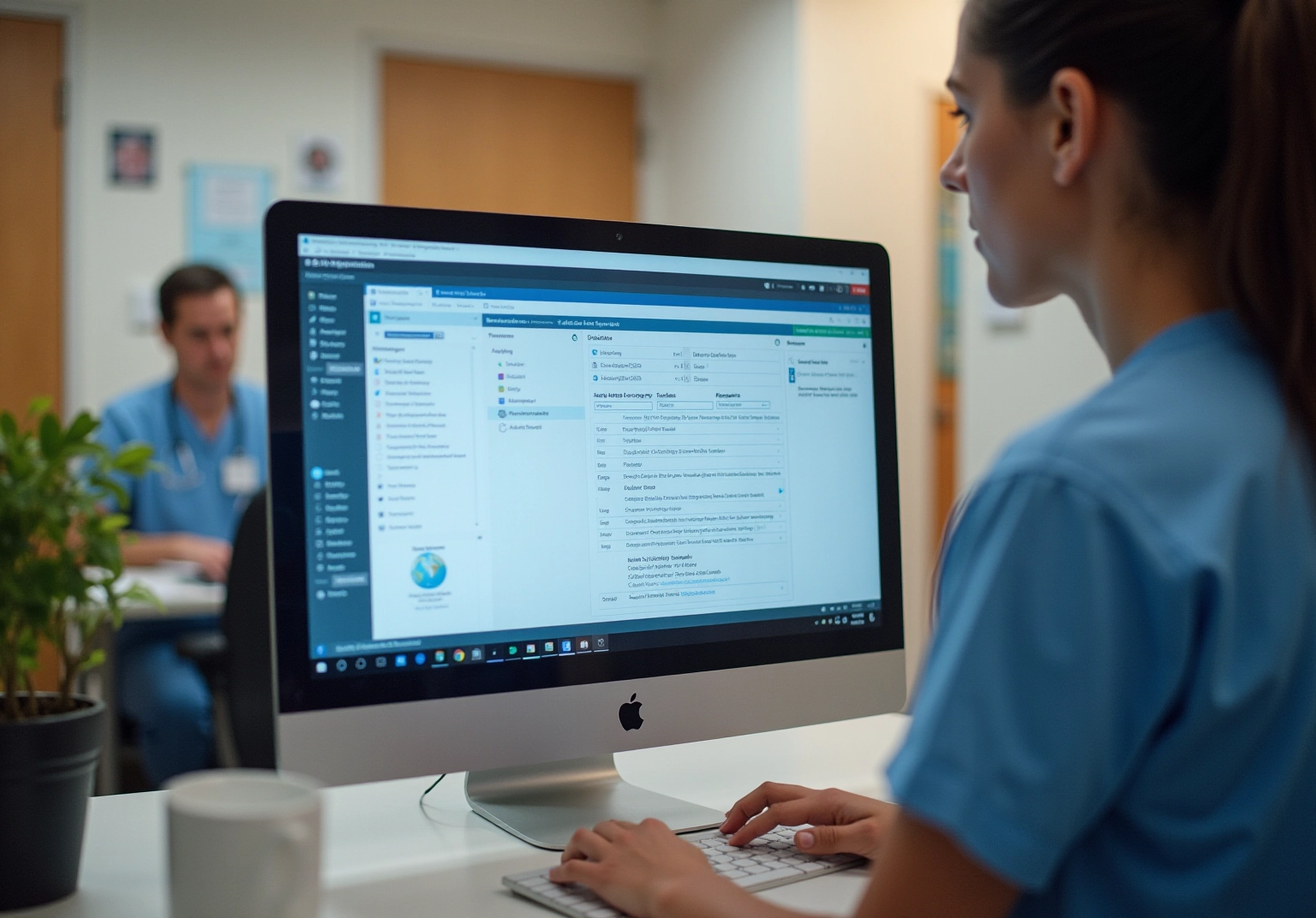
AI and automation are revolutionizing healthcare efficiency by streamlining administrative tasks, enhancing diagnostic accuracy, and personalizing patient care.
Consider the challenges faced by healthcare providers: administrative burdens can overwhelm staff and detract from patient care. Enter AI solutions, such as the HCC Assistant, which significantly increases coding efficiency and boosts Risk Adjustment Factor scores.
Moreover, AI in medical imaging accelerates diagnoses, allowing for quicker treatment decisions. Personalized medicine further exemplifies this innovation, improving treatment outcomes tailored to individual patient needs.
Collectively, these advancements not only alleviate administrative pressures but also enhance the overall quality of care delivered to patients.
In an era where healthcare demands efficiency and accuracy, the integration of artificial intelligence (AI) and automation emerges as a pivotal solution. These technologies not only streamline administrative tasks but also enhance diagnostic precision and foster patient engagement, ultimately transforming the healthcare landscape.
However, as the medical community embraces these innovations, critical questions arise regarding the balance between technological advancement and the essential human touch in patient care.
What challenges lie ahead as healthcare professionals navigate this new frontier of AI-driven solutions?
The HCC Assistant by Inferscience revolutionizes the collection and analysis of clinical data, delivering timely coding suggestions directly at the point of care. This groundbreaking tool simplifies the HCC coding process, resulting in a remarkable 15% rise in Risk Adjustment Factor (RAF) scores—essential for optimizing funding from Medicare Advantage beneficiaries.
By seamlessly connecting with electronic health records (EHRs), the HCC Assistant alleviates the administrative burden on medical providers, enabling them to concentrate on delivering quality care while ensuring compliance with coding regulations.
Furthermore, the application of advanced natural language processing (NLP) technology enhances the integration of individual data, boosting predictive accuracy by 22%. This highlights the tool’s significance in increasing overall coding efficiency and adherence within the medical field.

AI technologies in medical imaging are revolutionizing the way medical practitioners diagnose conditions. By harnessing advanced algorithms, AI analyzes medical images with extraordinary speed and precision, often outpacing human capabilities. This advancement not only enhances diagnostic accuracy but also significantly reduces the time required for image analysis. As a result, clinical decisions can be made more swiftly, leading to improved outcomes for patients. The integration of AI and automation in healthcare is not merely a trend; it is a transformative solution that empowers healthcare professionals to deliver better care.

AI and automation in healthcare are revolutionizing medical services by optimizing interactions, from appointment arrangements to addressing health-related inquiries. These intelligent tools that leverage AI and automation in healthcare can automate approximately 30% of interactions with patients, significantly alleviating the administrative burden for service providers. By delivering prompt responses and assistance, AI virtual assistants not only enhance satisfaction but also encourage greater engagement, ultimately leading to improved health outcomes.
For instance, the HCC Assistant by Inferscience demonstrates how AI can streamline coding processes, thereby maximizing funding and enhancing Risk Adjustment Factor scores. Furthermore, studies reveal that 64% of medical leaders report positive returns on investment from AI and automation in healthcare implementations, highlighting the effectiveness of these technologies in boosting operational efficiency.
As the medical sector increasingly embraces AI and automation in healthcare, the potential for improved communication and support for patients becomes more evident, paving the way for a more responsive and efficient healthcare system.
AI and automation in healthcare are revolutionizing administrative processes in the medical field, particularly in appointment scheduling, billing, and record-keeping. By 2030, AI and automation in healthcare are projected to automate up to 15% of current work hours, significantly minimizing time spent on repetitive tasks. This transformation allows medical providers to concentrate more on patient care, thereby enhancing operational efficiency and increasing job satisfaction among staff. Research indicates that automation could save the medical sector between $200 billion and $360 billion over five years by alleviating administrative burdens. This is particularly crucial, as approximately 24% of medical labor expenses are devoted to these tasks.
Case studies illustrate this shift effectively. For instance, Portsmouth Hospitals’ adoption of intelligent automation resulted in a remarkable 33% increase in maternity appointment capacity and financial savings of £105,000. Such examples underscore how AI and automation in healthcare not only streamline workflows but also enhance the overall patient experience. Furthermore, Inferscience’s HCC Assistant exemplifies how automation enhances coding accuracy and operational efficiency, empowering group medical practices to implement evidence-based medicine and adeptly manage complex cases. This tool aids medical organizations in optimizing Medicare Advantage funding while reducing the administrative burden associated with HCC coding, a critical factor in combating clinician burnout, as 45.2% of physicians report experiencing symptoms of burnout.
Thus, the integration of AI and automation in healthcare is essential for creating a more efficient and satisfying work environment for medical professionals.

AI is revolutionizing personalized medicine by meticulously analyzing extensive individual data, including genetic profiles and treatment responses. This capability empowers medical providers to formulate customized treatment plans that significantly enhance effectiveness for individual patients. By harnessing AI, clinicians can accurately predict responses to specific therapies, thereby improving outcomes and minimizing the trial-and-error approach traditionally associated with treatment selection.
Notably, AI-driven systems have demonstrated a remarkable 30-40% increase in survival rates for certain cancer types by analyzing genetic mutations and recommending targeted therapies. As the global market for AI and automation in healthcare is projected to reach approximately $49.49 billion by 2034, with a compound annual growth rate (CAGR) of 44.0% from 2025 to 2032, the integration of AI and automation in healthcare signifies not merely a trend but a profound transformation towards more personalized and effective patient care.
However, it is essential to acknowledge the challenges associated with AI adoption in healthcare, including privacy concerns and the necessity for skilled professionals, which must be addressed to fully realize its potential.
AI and automation in healthcare are revolutionizing drug discovery by streamlining the identification of potential drug candidates and refining trial designs. By analyzing complex biological data, AI can predict which compounds are most likely to succeed in trials, significantly reducing the time and costs associated with bringing new medications to market.
A study by Nature Digital Medicine indicates that AI can cut trial expenses by up to 70% and accelerate timelines by as much as 40%. This acceleration in drug development not only benefits pharmaceutical companies but also improves patient access to innovative therapies.
Recent case studies demonstrate that AI-discovered molecules achieve an impressive 80-90% success rate in Phase I trials, markedly higher than historical averages of 40-65%, while the success rate in Phase II trials remains competitive at approximately 40%.
However, challenges such as information privacy and ethical considerations must be addressed as AI continues to advance in trial designs. As we approach 2025, the integration of AI and automation in healthcare within clinical trial designs is anticipated to further evolve, optimizing processes and driving advancements in pharmaceutical research and development.
Remote health monitoring (RPM) powered by AI is revolutionizing the management of chronic illnesses through continuous tracking of health information. By analyzing this data in real-time, AI algorithms enable healthcare providers to identify potential health issues before they escalate. This proactive approach significantly enhances individual engagement, with studies indicating that RPM can elevate engagement levels by up to 80% and improve compliance with care plans by over 70%. Furthermore, the prompt interventions facilitated by AI-driven insights lead to better health outcomes, as evidenced by a remarkable 76% reduction in hospital readmissions reported by the University of Pittsburgh Medical Center for high-risk individuals utilizing RPM.
By personalizing care plans to meet individual patient needs, AI not only cultivates a more tailored healthcare experience but also contributes to a substantial decrease in hospital admissions for chronic conditions, with reductions ranging from 19% to 41% across various organizations. As the integration of AI in RPM continues to advance, it is poised to play a critical role in enhancing the efficiency and effectiveness of chronic disease management.

The integration of AI and automation in healthcare is fundamentally reshaping the landscape of medical services, significantly enhancing both efficiency and patient care. By streamlining processes such as HCC coding, medical imaging, patient engagement, and drug discovery, these advanced technologies are not merely improving operational metrics; they are transforming the delivery of healthcare itself. The central message emphasizes that embracing AI and automation is essential for achieving a more effective, responsive, and patient-centered healthcare system.
Throughout this article, various applications of AI and automation have been explored, underscoring their profound impact on efficiency. The Inferscience HCC Assistant exemplifies how automation can enhance coding accuracy and compliance, while AI in medical imaging accelerates diagnostic processes. Furthermore, AI virtual assistants improve patient engagement, and remote monitoring tools facilitate proactive chronic disease management. Each of these innovations contributes to reducing administrative burdens and enhancing overall patient outcomes, showcasing the multifaceted benefits of integrating technology into healthcare practices.
Ultimately, the ongoing evolution of AI and automation presents a pivotal opportunity for the healthcare sector to innovate and improve. As the industry continues to adopt these technologies, it is crucial for stakeholders—providers, policymakers, and patients alike—to recognize the transformative potential of AI in creating a more efficient, effective, and personalized healthcare experience. Embracing these advancements not only promises enhanced operational efficiencies but also paves the way for improved health outcomes, ultimately benefiting society as a whole.